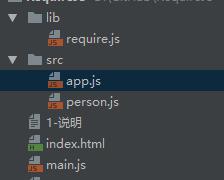(一)requireJs 的整体结构:
requireJS 源码 前192行,是一些 变量的声明,工具函数的实现 以及 对 三个全局变量(requirejs,require,define)若被占用后的具体处理。
从 194行到 1674行,整整 1480行,是 实例化上下文 函数 newContext() 。
在 在req({ } ) 调用时执行 newContext函数,而且只会执行一次。
从1690行开始,便是对外API require/requirejs/define 的具体实现。
(二)简单的demo 层级。


1 require.config({ 2 //根基目录baseUrl:'', 3 paths: { 4 app: 'src/app' 5 } 6 }); 7 8 /** 9 * Require 默认指定的所有资源都是JS文件,不需要在module 上添加.js后缀 10 * 11 * */ 12 require([ 13 'src/app' 14 ], function (app) { 15 app.sayBy('美丽的女孩 Rose'); 16 app.sayGood("美丽的女孩 Lily"); 17 })

1 define(['./person'],function (person) { 2 var sayGood = function (name) { 3 console.log('早上好 ' + name); 4 }; 5 6 var sayBy = function (name) { 7 console.log(person.run()); 8 console.log('再见 ' + name); 9 }; 10 11 return { 12 sayGood: sayGood, 13 sayBy: sayBy 14 } 15 });

define(function(require,exports,module){ exports.run=function(){ console.log('there is a person run....'); } });

<script data-main="main.js" src="lib/require.js"></script>
从index.html 中,我们看到<script data-main="main" src="lib/require.js"></script>
采用了 data-main 这样一个自定义属性,指定了入口js文件。跟着这条线,我们可以进入requireJS的大门。
(三)源码分析
1762行会创建 默认上下文执行环境
使用 require('person'),便是调用了这个函数。
首次调用时,便会创建 default context,
这是因为req() ===> 调用了 function newContext()。
在1922行代码处,开始处理 data-main 属性值,去加载我们这里的main.js文件。
1 //Look for a data-main script attribute, which could also adjust the baseUrl. 2 /** 3 * 判断是否在浏览器中运行(requireJS不止用在浏览器中) 4 * */ 5 if (isBrowser && !cfg.skipDataMain) { 6 //Figure out baseUrl. Get it from the script tag with require.js in it. 7 /** 8 * 通过 document.getElementsByTagName('script') 拿到所有 script 的标签集合(HTMLCollection) 9 * */ 10 eachReverse(scripts(), function (script) { 11 12 /**然后使用 eachRevers() 倒序 script 里面的内容 13 * head = 如果不存在 base标签 ? head 标签元素 : base.parentNode 14 * 如果head不存在,拿到script里面的父元素 15 */ 16 if (!head) { 17 head = script.parentNode; 18 } 19 20 dataMain = script.getAttribute('data-main'); /**dataMain= main.js*/ 21 if (dataMain) { 22 //Preserve dataMain in case it is a path (i.e. contains '?') 23 mainScript = dataMain; 24 25 //Set final baseUrl if there is not already an explicit one. 26 if (!cfg.baseUrl) { 27 /** 28 * src 已经变成数组,出队列,mainScript=main.js 29 * */ 30 src = mainScript.split('/'); 31 mainScript = src.pop(); 32 subPath = src.length ? src.join('/') + '/' : './'; 33 34 /*** 35 * src.length=0,cfg.baseUrl='./' 36 * 目的是与 main.js 统一目录 37 * */ 38 cfg.baseUrl = subPath; 39 } 40 41 /** 正则匹配,mainScript=main,此时去掉 .js 后缀,看起来更像是一个 module */ 42 mainScript = mainScript.replace(jsSuffixRegExp, ''); 43 44 //If mainScript is still a path, fall back to dataMain 45 if (req.jsExtRegExp.test(mainScript)) { 46 mainScript = dataMain; 47 } 48 49 /** 将主入口js文件放入 加载的配置文件列表中,将对 main.js 进行加载 ---req(cfg) */ 50 cfg.deps = cfg.deps ? cfg.deps.concat(mainScript) : [mainScript]; 51 52 return true; 53 } 54 }); 55 }
经过上述代码的处理,cfg.deps值已经发生改变,已包括 main.js,接下来便要去获取 main.js中的内容,以及与它相关联的内容。








 浙公网安备 33010602011771号
浙公网安备 33010602011771号